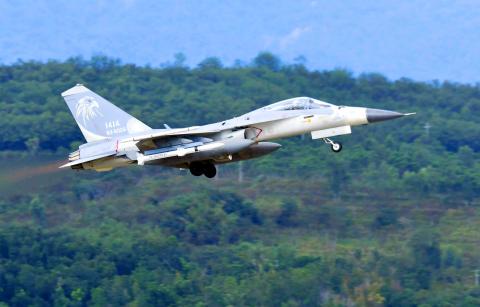An extended-range version of the Tien Chien II “Sky Sword” air-to-air missile has undergone successful testing and is to arm the air force’s Indigenous Defense Fighter jets, a defense official said on condition of anonymity.
Tien Chien II, or TC-2, was originally developed as a family of air-to-air missiles that could be launched from army, navy and air force platforms.
The new TC-2C missiles have an extended effective range of 100km, up from 60km, as well as increased precision, the official said, adding that the Chungshan Institute of Science and Technology performed the tests.

Photo: Yu Tai-lang, Taipei Times
The Indigenous Defense Fighter jets, which equip two air force tactical fighter wings, have undergone fleetwide improvements that increased their weapons load from two to four Tien Chien II missiles, the official said, adding that carrying four TC-2C missiles significantly increases the firepower of the jets.
The Chungshan Institute is also developing the TC-2N, a dedicated naval version of the Tien Chien II missile that could be fired from warships’ vertical launch systems or other systems, the official said.
The TC-2N is the planned successor for the MIM-72 Chaparral missiles that the navy’s La Fayette-class frigates are equipped with, the official said.
The navy would begin replacing the missiles from 2020, Navy Chief of Staff Lee Tsung-hsiao (李宗孝) last week told the Legislative Yuan’s Foreign Affairs and National Defense Committee.
The TC-2N would be a vast improvement on the obsolete and short-range MIM-72, sources said.
The Chungshan Institute has been improving the performance of all Tien Chien II missile variants, the official said, adding that the air force and navy were happy with the new missile prototypes, but the army has not shown interest.
Chinese-language Up Media yesterday said that the Ministry of National Defense is soon to declare the extended-range variant of Hsiung Feng IIE (HF-2E) cruise missiles ready for mass production.
The HF-2E extended-range surface-to--surface cruise missile has an effective range that exceeds 1,000km, compared with 600km for the older HF-2E.
The weapon was successfully tested for deployment in 2008, and its performance and range have been improved since then, the Web site said.
The ministry is considering three proposals to field and integrate the HF-2E extended-range missiles, and is to submit a brief to President Tsai Ing-wen (蔡英文) for her consideration before initiating mass production, it said.
The first proposal would see the existing 240 HF-2E missiles upgraded to the current standard, Up Media said, adding that officials consider this to be the quickest way to upgrade the missile arsenal.
The second proposal would see the navy field a mixture of the older HF-2E and the extended range variant, it said, adding the third proposal is to increase the overall number of HF-2E missiles in the military’s arsenal, a plan that could be implemented in conjunction with the above two.
Tsai would choose from the options after the ministry submits its brief, it said.

INVESTIGATION: The case is the latest instance of a DPP figure being implicated in an espionage network accused of allegedly leaking information to Chinese intelligence Democratic Progressive Party (DPP) member Ho Jen-chieh (何仁傑) was detained and held incommunicado yesterday on suspicion of spying for China during his tenure as assistant to then-minister of foreign affairs Joseph Wu (吳釗燮). The Taipei District Prosecutors’ Office said Ho was implicated during its investigation into alleged spying activities by former Presidential Office consultant Wu Shang-yu (吳尚雨). Prosecutors said there is reason to believe Ho breached the National Security Act (國家安全法) by leaking classified Ministry of Foreign Affairs information to Chinese intelligence. Following interrogation, prosecutors petitioned the Taipei District Court to detain Ho, citing concerns over potential collusion or tampering of evidence. The

NEGOTIATIONS: Taiwan has good relations with Washington and the outlook for the negotiations looks promising, Minister of Economic Affairs J.W. Kuo said Taiwan’s GDP growth this year is expected to decrease by 0.43 to 1.61 percentage points due to the effects of US tariffs, National Development Council (NDC) Minister Paul Liu (劉鏡清) said at a meeting of the legislature’s Economics Committee in Taipei yesterday, citing a preliminary estimate by a private research institution. Taiwan’s economy would be significantly affected by the 32 percent “reciprocal” tariffs slapped by the US, which took effect yesterday, Liu said, adding that GDP growth could fall below 3 percent and potentially even dip below 2 percent to 1.53 percent this year. The council has commissioned another institution

NEGOTIATIONS: The US response to the countermeasures and plans Taiwan presented has been positive, including boosting procurement and investment, the president said Taiwan is included in the first group for trade negotiations with the US, President William Lai (賴清德) said yesterday, as he seeks to shield Taiwanese exporters from a 32 percent tariff. In Washington, US Trade Representative Jamieson Greer said in an interview on Fox News on Thursday that he would speak to his Taiwanese and Israeli counterparts yesterday about tariffs after holding a long discussion with the Vietnamese earlier. US President Donald Trump on Wednesday postponed punishing levies on multiple trade partners, including Taiwan, for three months after trillions of US dollars were wiped off global markets. He has maintained a 10 percent

TRADE: The premier pledged safeguards on ‘Made in Taiwan’ labeling, anti-dumping measures and stricter export controls to strengthen its position in trade talks Products labeled “made in Taiwan” must be genuinely made in Taiwan, Premier Cho Jung-tai (卓榮泰) said yesterday, vowing to enforce strict safeguards against “origin laundering” and initiate anti-dumping investigations to prevent China dumping its products in Taiwan. Cho made the remarks in a discussion session with representatives from industries in Kaohsiung. In response to the US government’s recent announcement of “reciprocal” tariffs on its trading partners, President William Lai (賴清德) and Cho last week began a series of consultations with industry leaders nationwide to gather feedback and address concerns. Taiwanese and US officials held a videoconference on Friday evening to discuss the